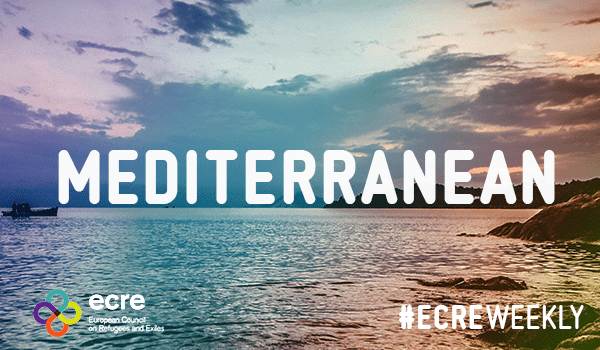Civilian search and rescue vessels Aita Mari and Geo Barents have saved and disembarked hundreds of survivors in Lampedusa and Sicily in the latest week of January. An Italian Court has acquitted rescuers from the NGO Mediterranea Saving Humans, shelving the investigation against them. Nearly 100 organisations have called for Italy to axe its Memorandum of Understanding (MoU) with Libya. Amongst other egregious crimes, people on the move in Libya are exposed to land border pushbacks.
Throughout 2021 the NGO hotline Alarm Phone assisted in a total of 778 distress situations marking the second busiest year the organisation has recorded. 407 cases involved boats in distress on the Central Mediterranean. According to the International Organization for Migration (IOM) 82 people have died or gone missing on the dangerous route in the first 29 days of 2022. Civilian efforts to save lives continue: on 30 January the Geo Barents vessel operated by Médecins Sans Frontières (MSF) was assigned port in Augusta, Sicily to disembark 439 people rescued in 5 operations between 19 and 21 January. The next day, the Aita Mari disembarked 176 survivors including 42 children in Lampedusa who had been rescued 48 hours prior. Civilian rescuers continue to report that Italian authorities impose administrative, procedural and legal hurdles to impede their work. The Aita Mari crew for instance were placed in a ten-day quarantine despite testing negative for the virus. Following the recently dismissed case against captain Carola Rackete from Sea Watch, Italian prosecutors have now shelved a case against rescuers from Mediterranea Saving Humans. On 28 January the captain and head of operations of Mediterranea’s rescue vessel, the Mare Jonio, were acquitted of charges of assisting ‘illegal” immigration by refusing Italian orders to return 27 survivors to the so-called Libyan Coast Guard. The incident dates abck to May 2019, when ports were closed by former Interior Minister Matteo Salvini – currently facing charges himself – on the pretext of security decrees.
ECRE member ASGI has launched an appeal calling for an end to the Italy-Libya MoU that will expire in February 2023. Since the deal was signed in 2017, more than 82,000 people have been intercepted and returned to Libya with the material support of Italy and the EU. Further, campaigners highlight that “EU leaders’ cooperation with Libyan authorities is keeping desperate people trapped in unimaginable horrors in Libya. Over the past five years, Italy, Malta and the EU have helped capture tens of thousands of women, men and children at sea, many of whom ended up in horrific detention centres rife with torture, while countless others were forcibly disappeared” said Amnesty International. Sally Hayden, writing for the The Irish Times, notes that there have been: “multiple submissions to the International Criminal Court calling for European and Libyan officials, along with others culpable for abuses in Libya, to be investigated for crimes against humanity. In October, an independent fact-finding mission appointed by the UN Human Rights Council produced a report saying there is evidence of crimes against humanity and war crimes being committed against forcibly returned refugees and migrants” and yet: “the EU continues to pump money into stopping refugees from leaving there: equipping and training the Libyan coastguard”. EU support for the Libyan Coast Guard began in 2016, and increased following the adoption of the Malta Declaration in February 2017. Alarm Phone describes how the steady removal of EU rescue assets has “created a vacuum in the central Mediterranean”: with Italian and Maltese authorities often unresponsive, people on the move are left either to die or face interception and return to Libya. According to the Middle East Eye the situation reflects a deliberate European strategy aimed at outsourcing migration prevention, regardless of the human cost. On 2 February, the European Parliament’s Committee on Foreign Affairs questioned EU cooperation with Libya and complicity in violations in Libya during an exchange with acting Director-General of DG NEAR, Maciej Popowski.
According to Benjamin Lewis from the UN Human Rights Agency (OHCHR), Libya is forcing people across its land borders into ‘no man’s land’ – remote stretches of deserts without water. Speaking to MEPs in the human rights sub-committee on 27 January, Lewis stated that such measures “appear linked to efforts to strengthen Libya’s external border enforcement so as to prevent migrants from eventually arriving to Europe,” and further noted: “According to one Libyan official, DCIM [the Libyan Department for Combating Illegal Migration] is now and I quote – deporting more people faster than ever before”. Official DCIM figures indicate that 7,500 people have been expelled across Libya’s external land borders in 2019 and 2020. However, the UN official suspects that the real numbers are much higher and include children and women entitled to protection under international law.
For further information:
- ECRE, Med: EU Report Calls for Continued Cooperation with Libya, UN SG Warns of Thousands Illegally Detained in ‘Inhumane’ Conditions, Civilian Rescues Continue Yet Death Toll Mounts, January 2022
- ECRE, Med: Rome Court Orders Humanitarian Visas for Two Afghans Within Ten Days, Ocean Viking Blocked in Italy, Case Submitted to ICC over Malta and Italy’s Complicity in Crimes in Libya, January 2022
Photo: ECRE
This article appeared in the ECRE Weekly Bulletin. You can subscribe to the Weekly Bulletin here.

